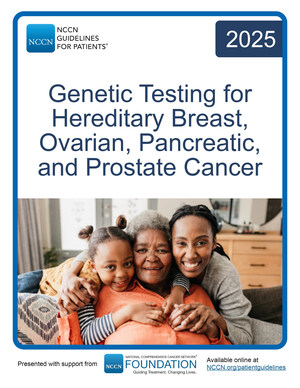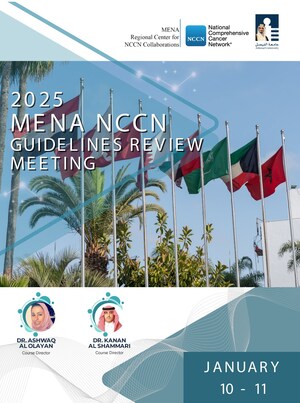Researchers from Johns Hopkins Kimmel Cancer Center Successfully Pilot Multidisciplinary Approach for Addressing Immunotherapy-Related Toxicities
Findings published in JNCCN confirm feasibility and necessity for institutional teams to provide rapid referrals for adverse events via an electronic method
PLYMOUTH MEETING, Pa., June 18, 2019 /PRNewswire/ -- New research from the Johns Hopkins Kimmel Cancer Center, published in the June 2019 issue of JNCCN—Journal of the National Comprehensive Cancer Network, suggests that institutions and networks that utilize immunotherapy as a treatment for cancer should consider establishing multidisciplinary teams for providing central, coordinated service for diagnosis and management of immunotherapy-related adverse events (irAEs). The researchers compiled a team of subspecialists across a variety of disciplines, who agreed to be contacted through a password-protected e-mail system. Team members replied to questions within 24 hours to provide the necessary feedback and referrals for the treatment of various irAEs.
"This service helped us identify the relevant specialists that providers can contact when needed, and may also potentially help coordinate the sharing of irAE data for research purposes," said lead researcher Jarushka Naidoo, MBBCh, The Sidney Kimmel Comprehensive Cancer Center at Johns Hopkins. "We identified which toxicities are most likely to require subspecialty input based on the breakdown of referrals for suspected and subsequently confirmed irAES. We found that the most commonly needed medical specialists were in pulmonary medicine, gastroenterology, endocrinology, and dermatology."
The researchers were surprised by just how successful the program was. During the eight-month pilot period, there were 117 referrals regarding 102 different patients, with all providers receiving toxicity management recommendations within 24 hours. The team was comprised of eight medical oncologists, four oncology nurses, four specialists in rheumatology, three in pulmonology, two each in neurology, endocrinology, dermatology, and ophthalmology, and one each in cardiology, hematology, and infectious disease. The time commitment was approximately four-to-six hours per week for central members, and two-to-four for the other specialists.
The service was so effective that referrals continued well beyond the pilot period. All of the 57 providers who responded to a post-pilot survey reported using all or some of the recommendations they received. 73.5% of referring providers said they changed their diagnostic evaluation or management of an immune-related toxicity as a result of the recommendations from the team.
"The immune checkpoint inhibitors (ICIs) have revolutionized medical oncology; ICI therapy induces objective responses and brings improved survival to patients with a variety of cancers. However, ICI therapy may trigger autoimmune side effects that bring inflammation and damage to virtually any tissue or organ," commented John A. Thompson, MD, Seattle Cancer Care Alliance, Chair of the NCCN Clinical Practice Guidelines in Oncology (NCCN Guidelines®) Panel for Management of Immunotherapy-Related Toxicity, who was not involved in the JNCCN study. "Healthcare providers in all specialties are now encountering patients with these toxicities for the first time and are looking for expert, actionable advice in real time. The Multidisciplinary ICI-Toxicity Consult Service described in this paper is an important new resource to support education and best-practice care, and to study these treatment-related concerns."
The researchers found that the establishment of the multidisciplinary toxicity team was feasible and effective for addressing the urgency and unexpected timing for irAEs. However, they stressed that in the most urgent cases, patients should continue to be treated by emergency departments.
To read the entire study, visit JNCCN.org. Complimentary access to "A Multidisciplinary Toxicity Team for Cancer Immunotherapy-Related Adverse Events" is available until September 10, 2019.
About JNCCN—Journal of the National Comprehensive Cancer Network
More than 25,000 oncologists and other cancer care professionals across the United States read JNCCN—Journal of the National Comprehensive Cancer Network. This peer-reviewed, indexed medical journal provides the latest information about best clinical practices, health services research, and translational medicine. JNCCN features updates on the NCCN Clinical Practice Guidelines in Oncology (NCCN Guidelines®), review articles elaborating on guidelines recommendations, health services research, and case reports highlighting molecular insights in patient care. JNCCN is published by Harborside. Visit JNCCN.org. To inquire if you are eligible for a FREE subscription to JNCCN, visit http://www.nccn.org/jnccn/subscribe.asp. Follow JNCCN on Twitter @JNCCN.
About the National Comprehensive Cancer Network
The National Comprehensive Cancer Network® (NCCN®) is a not-for-profit alliance of 28 leading cancer centers devoted to patient care, research, and education. NCCN is dedicated to improving and facilitating quality, effective, efficient, and accessible cancer care so patients can live better lives. Through the leadership and expertise of clinical professionals at NCCN Member Institutions, NCCN develops resources that present valuable information to the numerous stakeholders in the health care delivery system. By defining and advancing high-quality cancer care, NCCN promotes the importance of continuous quality improvement and recognizes the significance of creating clinical practice guidelines appropriate for use by patients, clinicians, and other health care decision-makers around the world.
The NCCN Member Institutions are: Abramson Cancer Center at the University of Pennsylvania, Philadelphia, PA; Fred & Pamela Buffett Cancer Center, Omaha, NE; Case Comprehensive Cancer Center/University Hospitals Seidman Cancer Center and Cleveland Clinic Taussig Cancer Institute, Cleveland, OH; City of Hope National Medical Center, Duarte, CA; Dana-Farber/Brigham and Women's Cancer Center | Massachusetts General Hospital Cancer Center, Boston, MA; Duke Cancer Institute, Durham, NC; Fox Chase Cancer Center, Philadelphia, PA; Huntsman Cancer Institute at the University of Utah, Salt Lake City, UT; Fred Hutchinson Cancer Research Center/Seattle Cancer Care Alliance, Seattle, WA; The Sidney Kimmel Comprehensive Cancer Center at Johns Hopkins, Baltimore, MD; Robert H. Lurie Comprehensive Cancer Center of Northwestern University, Chicago, IL; Mayo Clinic Cancer Center, Phoenix/Scottsdale, AZ, Jacksonville, FL, and Rochester, MN; Memorial Sloan Kettering Cancer Center, New York, NY; Moffitt Cancer Center, Tampa, FL; The Ohio State University Comprehensive Cancer Center - James Cancer Hospital and Solove Research Institute, Columbus, OH; O'Neal Comprehensive Cancer Center at UAB, Birmingham, AL; Roswell Park Comprehensive Cancer Center, Buffalo, NY; Siteman Cancer Center at Barnes-Jewish Hospital and Washington University School of Medicine, St. Louis, MO; St. Jude Children's Research Hospital/The University of Tennessee Health Science Center, Memphis, TN; Stanford Cancer Institute, Stanford, CA; UC San Diego Moores Cancer Center, La Jolla, CA; UCSF Helen Diller Family Comprehensive Cancer Center, San Francisco, CA; University of Colorado Cancer Center, Aurora, CO; University of Michigan Rogel Cancer Center, Ann Arbor, MI; The University of Texas MD Anderson Cancer Center, Houston, TX; University of Wisconsin Carbone Cancer Center, Madison, WI; Vanderbilt-Ingram Cancer Center, Nashville, TN; and Yale Cancer Center/Smilow Cancer Hospital, New Haven, CT.
Clinicians, visit NCCN.org. Patients and caregivers, visit NCCN.org/patients. Media, visit NCCN.org/news. Follow NCCN on Twitter @NCCN, Facebook @NCCNorg, and Instagram @NCCNorg.
Media Contact:
Rachel Darwin
267-622-6624
darwin@nccn.org
SOURCE National Comprehensive Cancer Network

Related Links
WANT YOUR COMPANY'S NEWS FEATURED ON PRNEWSWIRE.COM?
Newsrooms &
Influencers
Digital Media
Outlets
Journalists
Opted In






Share this article